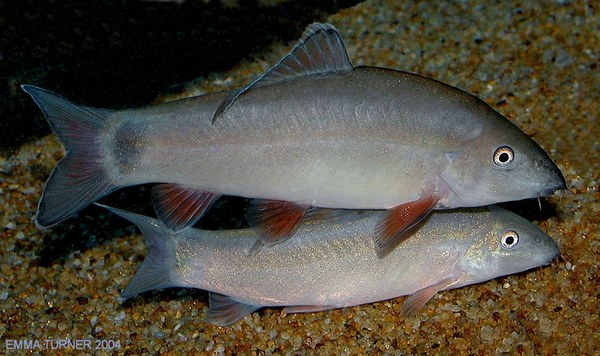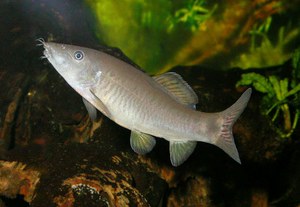Yasuhikotakia eos
Summary
Scientific name: Yasuhikotakia eos (Kottelat, 2004)
Common name: Sun loach
Synonyms: Botia eos (Taki, 1972)
Distribution: Mekong basin, Chao Phraya and Maeklong basins (Cambodia, Laos, Thailand, Vietnam).
Sexual Dimorphism: Mature females likely to have a rounder abdominal area.
Maximum size: 4.25 inches (11cm)
Similar to: Yasuhikotakia modesta, Y. lecontei.

Care: Sun loaches hail from rapidly flowing rivers and will appreciate a good amount of water movement and aeration in the aquarium. The aquarium should be at least 4ft long, and furnished with a sand substrate and plenty of hiding places amongst cobbles, rocks, and bogwood.
 Feeding: Most aquarium foods are
eagerly accepted - sinking catfish pellets, frozen mosquito larvae, brineshrimp,
daphnia, mysis shrimp etc. Larger specimens will enjoy chopped prawns (salad
shrimp). Will eat soft leaved aquatic plants, and is excellent at keeping snail
populations under control.
Feeding: Most aquarium foods are
eagerly accepted - sinking catfish pellets, frozen mosquito larvae, brineshrimp,
daphnia, mysis shrimp etc. Larger specimens will enjoy chopped prawns (salad
shrimp). Will eat soft leaved aquatic plants, and is excellent at keeping snail
populations under control.
Water parameters: pH: 6.0 - 7.5, Hardness: Soft and slightly acidic is best. Max dh: 12.
Temperature: 75ºF to 82 ºF (24-28°C)
Breeding: No reports of aquarium spawnings. In the wild they are said to migrate to flooded regions to spawn.
Notes
 Yasuhikotakia eos is an aggressive fish, that
is best maintained in either a species-only aquarium, or with other belligerent
loach species in an 'aggressive loach aquarium' with tankmates such as Y. lecontei, Y. morleti, or the Tiger-Botia group (Syncrossus species). They should be kept in
social groups of at least 5 specimens in order for them to form a natural
hierarchy.
Yasuhikotakia eos is an aggressive fish, that
is best maintained in either a species-only aquarium, or with other belligerent
loach species in an 'aggressive loach aquarium' with tankmates such as Y. lecontei, Y. morleti, or the Tiger-Botia group (Syncrossus species). They should be kept in
social groups of at least 5 specimens in order for them to form a natural
hierarchy.
Capable of making very loud clicking sounds during interactions or feeding.
False reports of curbing aggression levels by keeping one per tank is simply cruel and will result in a reclusive fish that does not behave as nature intended.
This species is nocturnal and can be observed well under blue moon lighting in the evenings.
Juveniles usually sport dark vertical bars along the flanks. Y. eos has 10-11 branched dorsal ray fins, whereas the similar-looking species Y. modesta has 9.
Yasuhikotakia eos will sleep on their sides like many other Botiine Loaches
Document Actions



